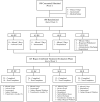A randomized controlled trial of fluoxetine in the treatment of cocaine dependence among methadone-maintained patients
- PMID: 21266301
- PMCID: PMC3078567
- DOI: 10.1016/j.jsat.2010.11.010
A randomized controlled trial of fluoxetine in the treatment of cocaine dependence among methadone-maintained patients
Abstract
Background: Cocaine abuse and dependence continue to be widespread. Currently, there are no pharmacotherapies shown to be effective in the treatment of cocaine dependence.
Methods: A 33-week outpatient clinical trial of fluoxetine (60 mg/day, po) for cocaine dependence that incorporated abstinence-contingent voucher incentives was conducted. Participants (N = 145) were both cocaine and opioid dependent and treated with methadone. A stratified randomization procedure assigned subjects to one of four conditions: fluoxetine plus voucher incentives (FV), placebo plus voucher incentives (PV), fluoxetine without vouchers (F), and placebo without vouchers (P). Dosing of fluoxetine/placebo was double blind. Primary outcomes were treatment retention and cocaine use based on thrice-weekly urine testing.
Results: The PV group had the longest treatment retention (M = 165 days) and lowest probability of cocaine use. The adjusted predicted probabilities of cocaine use were 65% in the P group, 60% in the F group, 56% in the FV group, and 31% in the PV group.
Conclusions: Fluoxetine was not efficacious in reducing cocaine use in patients dually dependent on cocaine and opioids.
Copyright © 2011 Elsevier Inc. All rights reserved.
Conflict of interest statement
Figures




References
-
- Batki SL, Manfredit LB, Jacob P, Jones RT. Fluoxetine for cocaine dependence in methadone maintenance: Quantitative plasma and urine cocaine/benzoylecgonine concentrations. J Clin Psychopharmacol. 1993;13:243–250. - PubMed
-
- Batki SL, Washburn AW, Delucchi K, Jones RT. A controlled trial of fluoxetine in crack cocaine dependence. Drug Alc Depend. 1996;41:137–142. - PubMed
-
- Beck AT, Ward CH, Mendelson M, Mock J, Erbaugh J. An inventory for measuring depression. Archives of Gen Psychiatry. 1961;4:561–571. - PubMed
-
- Brower KK, Carey TL. Racially related health disparities and alcoholism treatment outcomes. Alcohol Clin Exp Res. 2003;27(8):1365–7. - PubMed
-
- Durta L, Stathopoulou G, Basden SL, Leyro TM, Powers MB, Otto MW. A meta-analytic review of psychosocial interventions for substance use disorders. Am J Psychiatry. 2008;165(2):179–187. - PubMed
Publication types
MeSH terms
Substances
Grants and funding
LinkOut - more resources
Full Text Sources
Medical

